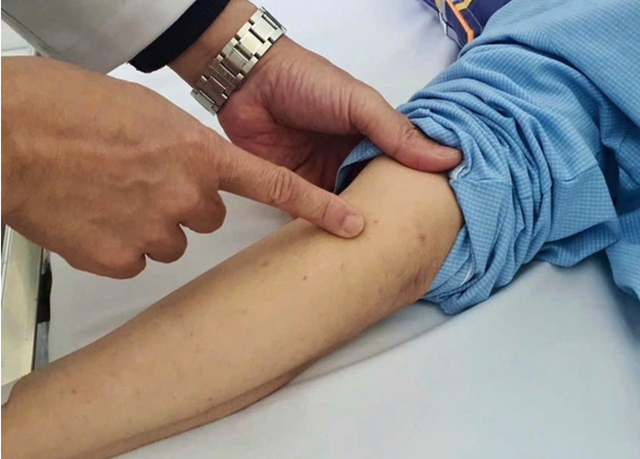How dangerous is meningococcal meningitis?
Specialist Doctor Ho Thanh Lich, Deputy Head of the Department of Intensive Care - Emergency at Nam Sai Gon International General Hospital, said that meningococcal meningitis is a disease caused by dangerous group B bacteria (Neisseria meningitidis) that resides in the throat, transmitted through droplets, often occurring in densely populated areas such as dormitories, kindergartens, schools, etc. Meningococcal meningitis is divided into many types of disease. In mild form, symptoms are similar to other types of meningitis and can usually recover after about 2 weeks if treated properly. However, in dangerous conditions, meningococcal meningitis can progress very quickly in just a few hours to a few days.
Purpura necrosis on the patient's skin
PHOTO: NGUYEN HA
"Meningococcal meningitis is a dangerous disease, with a mortality rate of up to 10-20%. More worryingly, in severe cases accompanied by sepsis or acute adrenal insufficiency, the patient can die within 24 hours if not detected and treated promptly. Therefore, early recognition, isolation and timely treatment are very important factors," Dr. Thanh Lich shared.
When encephalitis occurs, brain cells are damaged, leading to brain swelling and can cause a variety of serious symptoms. Depending on the location and severity of the inflammation, the disease can cause various complications, ranging from mild to severe, even life-threatening if not treated promptly.
Warning signs that require immediate medical attention
According to Dr. Thanh Lich, people need to pay special attention when they see the following symptoms:
High fever with severe headache : When the patient has a fever above 38.5 degrees Celsius accompanied by a headache, taking fever-reducing medicine but it does not improve..., it is an abnormal sign that needs to be monitored and examined early.
Disorders of consciousness : The patient may be lethargic, delirious, unaware of space, time or loved ones. In the elderly, the signs may be minor changes in behavior or personality.
Skin rash : Petechiae or blisters may appear. Nausea or vomiting. If vomiting is accompanied by severe headache, this is a sign of increased intracranial pressure and requires immediate medical attention.
Stiff neck : The patient feels pain and cannot lower the head to touch the chin to the chest.
"Although the disease can occur at any age, the elderly (over 60) are at higher risk due to weakened immune systems. In addition, children under 5 years old and the elderly often have atypical clinical manifestations, making it easy to overlook the early signs of the disease, leading to delays in diagnosis and treatment," Dr. Thanh Lich shared.
When a patient has a fever above 38.5 degrees Celsius accompanied by a headache, and fever-reducing medication does not relieve the symptoms..., it is an abnormal sign that needs to be monitored and examined early.
Photo: AI
Effective prevention
To prevent meningococcal meningitis, Dr. Thanh Lich recommends washing hands frequently and rinsing mouth with antiseptic solution. Ensure living environment is airy and clean. Get vaccinated fully, especially for young children and people with high risk factors.
There is now a vaccine to prevent meningococcal disease caused by serogroups A, B, C, Y, and W-135. If there are signs of suspected disease, the patient should be taken to a medical facility immediately.
Initial treatment before going to medical facility
Doctor Lich gives some first aid instructions when detecting signs of meningococcal meningitis in patients:
Stay calm and call for emergency help immediately. Place the patient in a safe side-lying position if there is a seizure or vomiting. Do not attempt to give the patient water or medication if the patient is unconscious. Monitor vital signs such as pulse and breathing if possible. Cool the body with a wet towel if the patient has a high fever. Create a quiet environment, reduce bright lights and noise.
"If not treated promptly, meningococcal meningitis can cause permanent brain damage, sepsis, multiple organ failure and even death within 24 - 48 hours. Delay in treatment significantly reduces the chance of survival and increases the risk of severe sequelae such as deafness, paralysis or neurological disorders," Dr. Thanh Lich noted.
Source: https://thanhnien.vn/viem-nao-mo-cau-dau-hieu-canh-bao-can-cap-cuu-ngay-185250513213053146.htm






















































![[Maritime News] More than 80% of global container shipping capacity is in the hands of MSC and major shipping alliances](https://vphoto.vietnam.vn/thumb/402x226/vietnam/resource/IMAGE/2025/7/16/6b4d586c984b4cbf8c5680352b9eaeb0)













































Comment (0)